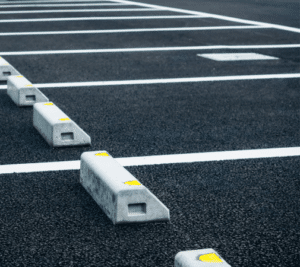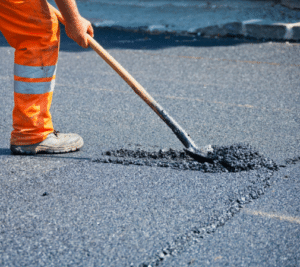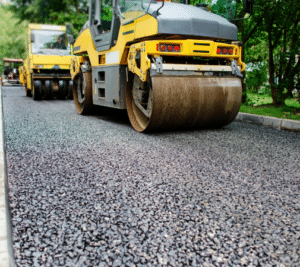Driveways are an essential part of modern houses. They provide versatile uses, including a parking spot for your vehicle(s), complementing your home and garden, and a playing ground for your family.
However, the cost of constructing a driveway makes most homeowners dread this process. But with our budget-friendly driveway ideas below, creating driveways should be something other than a pipe dream for homeowners on a budget.
Read on to learn about five budget driveway ideas.
Concrete Driveway
Homeowners’ most common and preferred type of budget driveway is concrete driveways. Their high cost-to-utilization ratio attracts homeowners, given they can last for 75 years and cost between $4 and $8 per square foot to install.
However, this budget-friendly driveway idea isn’t for D.I.Y. as it requires the expertise of a professional team like Saguaro Asphalt to install. All you need is a building permit if your local authority demands it.
A professional team ensures that the following requirements are met:
- Structural integrity includes a minimum concrete thickness of 4 inches, which can be increased to boost the load-carrying capacity of your driveway.
- Steel reinforcement for traffic-prone areas to provide more stability.
- Synthetic fibers to hold your slabs when they crack.
- A uniform subgrade of soil or material to prevent damage due to uneven levels or composition.
- Proper mixing of your concrete before pouring it on the subgrade material.
- Proper curing of the concrete to ensure longevity.
- Proper drainage to ensure that the structure isn’t compromised.
Disadvantages of concrete driveways
- Plain concrete driveways aren’t attractive, while decorative concrete driveways are costly and require more maintenance to last long.
- You must do annual concrete sealing to ensure longevity.
- Concrete driveways aren’t D.I.Y-friendly for large driveways as concrete starts to harden immediately after it’s poured.
Asphalt Driveway
Asphalt driveways are also known as blacktop driveways because of their nature. Unlike concrete and gravel driveways which come in different colors, these are always black because of the bitumen used to make them.
You’ll need a professional team to install your asphalt driveway since the process isn’t D.I.Y-friendly. Your team will ensure that your driveway meets the following required standards;
- Grading the surface
- Sub-base course preparation if the sub-base soil is weak and can’t offer structural support
- A well-drained base by compacting 4 to 8 inches of solid granules on top of your sub-base soil or material
- Adding a binder course made from coarse aggregate and bitumen
- Adding 2 to 3 inches of hot asphalt at the top and compressing it with a steamroller to ensure the course aggregate is uniform
Asphalt is made by mixing rock, asphalt cement, sand, and bitumen. Homeowners re-doing their asphalt driveway can recycle it to lower the costs of getting a new driveway. The asphalt driveway cost ranges between $7 to $13 per square foot.
Advantages of blacktop driveways
- They are the best driveways for slopes because of their excellent grip and traction, even in rainy seasons.
- They can last for 20 to 30 years.
- They are flexible hence outlasting concrete driveways because of their high-maintenance resealing needs.
- Resurfacing them is cheaper than concrete and brick driveways, which need complete demolition before resurfacing.
- It’s quicker to install and use asphalt driveways, unlike concrete ones, which must cure.
Despite these advantages, asphalt driveways generate a lot of heat in hot environments and are prone to tree or plant root damage.
Gravel driveway
A gravel driveway is cost-effective for homeowners, costing around $1 to $3 per square foot to install. Also, installing a gravel driveway can be an excellent D.I.Y option if you’re looking to drive costs down.
When installing your gravel driveway, dig a shallow trench and pour rocks at the base to provide the much-needed hard surface and anchor your gravel. Railroad ballasts are an excellent alternative for use as your base, costing around $0.83 per foot.
Once you’re through with the base, bring in your truckload of gravel, pour on the top side, and level it out evenly till it fills the spaces between your rocks. Gravel driveways are great for flood-prone areas, allowing water to seep through the rocks. They also come in different colors, complementing your garden or lawn.
Disadvantages Of Gravel Driveways
- The maintenance cost for gravel driveways can be high in the long run since you’ll need to replenish your gravel yearly.
- The possibility of plants encroaching your driveway increases if you don’t edge your gravel driveway.
- You’ll also need to rake your gravel occasionally to level it out.
Chip Seal Driveway
Chip seal driveways are a budget-friendly driveway idea many homeowners prefer to asphalt. These driveways have a rough texture that helps prevent slippage in wet or snowy environments, unlike concrete driveways.
The foundation of a chip seal driveway has to have a base material of around two layers to provide stability. Alternatively, you can use your existing driveway or pavement as the base material.
Afterward, a thin layer of hot liquid asphalt is poured on the base materials, and small washed rocks are compacted on top of the asphalt before it cools. This process results in the formation of a beautiful chip-sealed driveway.
Advantages Of Chip Seal Driveways
- It’s a budget-friendly driveway idea as costs range from $2 to $5 per square foot. Unlike concrete and asphalt driveways, they last for around 10 to 15 years and are easy to resurface.
- There’s no maintenance cost if you’re mindful when shoveling to avoid scraping the surface.
- These driveways don’t crack because of the elasticity of the surface.
- You can play around with the color of your rocks to add aesthetic value.
Paver driveways
Paver driveways can be made from clay, cobblestones, and concrete. Brick pavers are made from clay molded into rectangles and then heat-cured. Cobblestones are naturally occurring stones cut into pavers, while concrete pavers are molded bricks made from Portland cement and aggregate.
Brick pavers are the most commonly used pavers since time immemorial. They offer that classy-elegant look necessary as a first-time impression to guests and can last 20 to 30 years. They’re also easy to maintain, repair, and recycle. You can also complement your house with different paving colors, patterns, and shapes.
However, many homeowners tend to shy from paver driveways as they can be costly. The price ranges from $10 to $30 per square foot. Additionally, they’re labor-intensive to install and require sealing after every two years.
Need Help With Budget Driveway Ideas?
You don’t have to break the bank to get a new driveway. You can start your journey to owning a cost-effective driveway from the above ideas. Moreover, you can consult a professional team for a free quote on your much-needed budget-friendly driveway idea.



